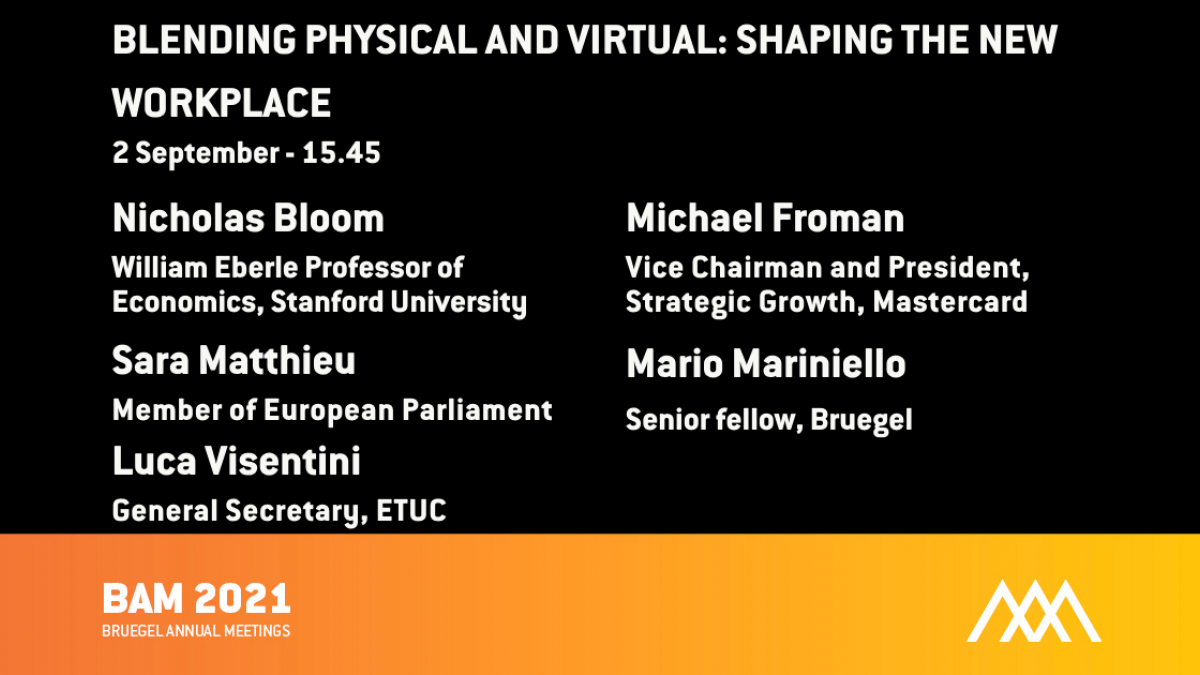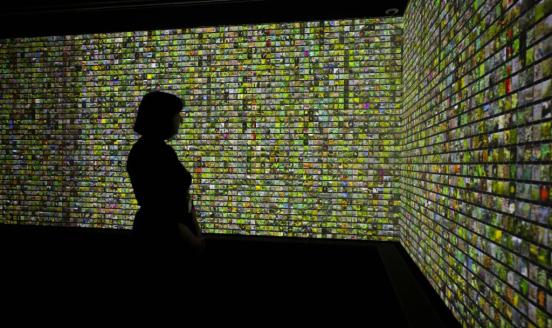Blending physical and virtual: shaping the new workplace
Bruegel Annual Meetings, Day 2 - This panel will cover the changes the COVID-19 pandemic made to our workplaces, and what to expect in the near future

Speakers
Mario Mariniello
Senior fellow,
Luca Visentini
General Secretary, European Trade Union Confederation
Michael Froman
Vice Chairman and President, Strategic Growth, Mastercard, Mastercard Center for Inclusive Growth
Nicholas Bloom
William Eberle Professor of Economics, United States, Stanford University
Sara Matthieu
Member, European Parliament, Group of the Greens/European Free Alliance
VIDEO AND AUDIO RECORDINGS
With the roll-out of COVID-19 vaccines, countries are beginning to imagine a future in which workers’ and employers’ choices are not conditioned by the pandemic. The crisis hit everyone hard but also generated an opportunity. It has shown that workers with suitable jobs can efficiently work remotely, with no negative implications for their productivity or performance From a European Union policy perspective, there is a clear opportunity to build on the lesson from the pandemic and create the conditions for hybrid work models within the single market. European trade unions and business federations should grab that opportunity and start an EU dialogue between employers, employees and governments.
What will offices look like in 2025? Will on-site and remote workers efficiently work together? What are the risks, the challenges that employers need to address? Is there a role for public policy to unlock remote work potential while ensuring workers’ well-being? What are the likely macro implications of enhanced workers’ geographical mobility?
Read the full output from Bruegel's Future of Work and Inclusive Growth Project
Designing a hybrid work organisation, Blog post by Laura Nurski.
Workers can unlock the artificial intelligence revolution, Blog post by Mia Hoffmann and Laura Nurski.
Blending the physical and virtual: a hybrid model for the future of work, Policy Contribution by Monika Grzegorczyk, Mario Mariniello, Laura Nurski and Tom Schraepen.
Algorithmic management is the past, not the future of work, Blog by Laura Nurski.
We need more bias in artificial intelligence, Opinion by Mario Mariniello.
Self-employment, COVID-19, and the future of work for knowledge workers, Blog Post by Milena Nikolova.
Fair vaccine access is a goal Europe cannot afford to miss, Blog post by Lionel Guetta-Jeanrenaud and Mario Mariniello.
Brussels’ Digital Plan Leaves the Key Issue Unaddressed, Opinion by Mario Mariniello.
The scarring effect of COVID-19: youth unemployment in Europe, Blog post by and Monika Grzegorczyk and Guntram Wolff.
Job polarisation and the Great Recession, Blog post by Sybrand Brekelmans and Georgios Petropoulos.
Artificial intelligence’s great impact on low and middle-skilled jobs, Blog post by Sybrand Brekelmans and Georgios Petropoulos.
summary
COVID-19 and the technological revolution are shaping the new workplace. The pandemic was an experiment that allowed us to challenge what we thought should be the norm. Before the pandemic, 85% of European workers had never teleworked in their life. Many of them did not know they could and now they want to retain the flexibility they’ve gained. On the other hand, many employers thought that working from home would impact productivity but surveys show that this did not happen. What have we learned from this mass experiment?
There are many dimensions that show that telework has the potential to exacerbate inequalities. Half of high paid workers could switch to telework when the crisis hit, compared with only 29% of low paid workers. We might expect that telework has some redistributive effects at the micro and macro levels. At the micro-level, evidence shows that it is more challenging for young workers to make a career, and female workers are more exposed to zoom fatigue. Telework has a profound impact on cities and peripheries, on local economies or the service sector at the macro level.
Another aspect is digital inclusiveness. We need to ensure that small and medium-sized businesses are connected to the digital economy to survive this kind of interruption. Workers should have what they need for their financial security and support for their jobs. Working from home represents an opportunity for better work-life balance, but it can also lead to isolation. That is why we need to give workers a choice.
The trend towards more gig economy workers that have been accelerated raised questions about the social safety net. To protect those workers, benefits should be portable, interoperable, people-centred and inclusive for all types of workers. We need to prevent unlimited working time, wage discrimination and reduction of teleworkers benefits.
As we see, there might be scope for policy intervention. In the European Union, there is a telework frame agreement that dates back to 2002. Considering technological change and the possibility of events like pandemics in the future, there is room for improvement of European Union regulation.








